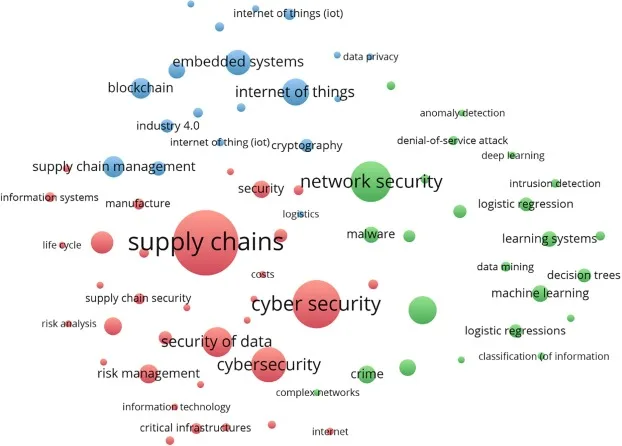Introduction
Supply chain management relies on cybersecurity to secure the integrity, confidentiality, and availability of data and systems throughout the supply chain. Supply chains have become increasingly vulnerable to cyber threats as they have gotten more digitised and networked. Here are some essential points emphasising the significance of cybersecurity in supply chain management:
- Data Protection: Customer data, intellectual property, financial information, and operational data are all exchanged in supply chains. Implementing strong cybersecurity safeguards protects this data from unauthorised access, breaches, and theft, while also preserving its confidentiality and integrity.
- Risk Mitigation: Cybersecurity measures aid in the identification and mitigation of potential risks and vulnerabilities in the supply chain. Regular risk assessments, vulnerability scanning, and penetration testing can assist in identifying and correcting flaws before they are exploited.
- Supplier Management: A supply chain frequently comprises a number of suppliers and partners, each with their own set of security practises and vulnerabilities. Organisations must verify that their suppliers follow stringent cybersecurity standards and put in place suitable measures. Supplier risk assessments and contractual agreements can aid in the establishment of security standards and the accountability of suppliers.
- Supply Chain Resilience: Cyberattacks can interrupt supply chain processes, resulting in delays, financial losses, and reputational damage. Organisations may improve their resilience to cyber threats and recover rapidly from incidents by deploying cybersecurity measures, reducing the impact on the supply chain.
- Regulatory Compliance: Many industries need organisations to follow certain cybersecurity legislation and standards, such as the General Data Protection Regulation (GDPR) and the Payment Card Industry Data Security Standard (PCI DSS). Compliance with these standards is critical for avoiding legal and financial ramifications, as well as building trust with consumers and stakeholders.
- Incident Response and Recovery: Despite precautions, cybersecurity events can occur. A well-defined incident response plan and robust recovery methods guarantee that any interruptions are discovered, contained, and resolved as soon as possible. This reduces the impact on the supply chain and allows for a quicker return to normal operations.
- Trust and Reputation: A solid cybersecurity posture increases consumer, partner, and stakeholder trust. Demonstrating a commitment to data security and supply chain security can provide organisations with a competitive advantage and boost their market reputation.
The Need for Data Protection in Supply Chains
Data has become the lifeblood of supply chains in the digital age, fuelling the efficient flow of commodities, information, and services. However, because this data-driven ecosystem is prone to cyber threats and attacks, data protection is a fundamental requirement for supply chain management.
In supply chains, data integrity is critical. Data can be tampered with if sufficient precautions are not in place, resulting in inaccuracies, disruptions, and mistrust. Encryption and access restrictions, for example, ensure that data remains unchanged and trustworthy throughout the supply chain.
Mitigating Risks in the Supply Chain
Data and system availability are critical for seamless supply chain operations. DDoS attacks, for example, can render systems inaccessible, causing delays and bottlenecks. Organisations can protect against such assaults by deploying cybersecurity measures such as firewalls and intrusion detection systems, assuring continuous availability and uninterrupted operations.
Data protection regulations must be followed in order to manage the supply chain. Regulations such as the GDPR require legal obligations to protect personal data, and failure to do so can result in harsh penalties. Organisations that prioritise cybersecurity achieve compliance, protect customer information, and adhere to regulatory norms.
Trust is a crucial asset in today’s competitive economy. Customers and partners gain trust when you demonstrate your commitment to data protection and cybersecurity. Organisations may assure their stakeholders that their data is secure by employing comprehensive cybersecurity procedures.
Managing Suppliers and Partners
Supply chains are complicated networks involving numerous partners, rendering them vulnerable to a variety of risks and vulnerabilities. It is critical to develop robust cybersecurity solutions that successfully mitigate these risks in order to ensure the smooth and safe movement of goods and information.
Conducting regular risk assessments inside the supply chain is one of the most important measures in risk mitigation. Organisations can address possible vulnerabilities and hazards before they are exploited by cybercriminals by proactively identifying them. This includes evaluating suppliers’, partners’, and other stakeholders’ security practises to ensure they fulfil the essential cybersecurity standards.
Furthermore, vulnerability scanning and penetration testing are critical risk-mitigation tools. These techniques aid in identifying any flaws or gaps in the supply chain’s security infrastructure. Organisations can enhance their defences and avoid any breaches or attacks by fixing these vulnerabilities as soon as possible.
Furthermore, teaching employees and stakeholders about cybersecurity best practises is critical for risk mitigation. Human error, such as falling victim to phishing attacks or having weak passwords, is frequently a significant element in cyber accidents. Organisations may empower their workers to make educated decisions and take proactive efforts to secure the supply chain by giving regular training and raising knowledge about potential hazards.
Ensuring Supply Chain Resilience
Supply chain resilience is crucial in maintaining the continuity of operations and mitigating the impact of cyber incidents. By implementing robust cybersecurity measures, organizations can enhance the resilience of their supply chains. This involves developing incident response plans that outline the steps to be taken in the event of a cyberattack, ensuring timely detection, containment, and recovery. Additionally, organizations can implement backup and disaster recovery mechanisms to minimize downtime and quickly restore operations. Regular testing and simulation exercises can help identify potential vulnerabilities and strengthen the overall resilience of the supply chain. By prioritizing resilience, organizations can minimize the impact of cyber incidents and ensure the uninterrupted flow of goods and services.
Regulatory Compliance and Standards
Regulatory compliance is critical in supply chain management to guarantee data protection and legal standards are met. Organisations must follow industry-specific cybersecurity legislation and standards. The General Data Protection Regulation (GDPR), for example, oversees the processing and storage of personal data, whilst the Payment Card Industry Data Security Standard (PCI DSS) provides secure payment card information handling. Compliance with these rules necessitates the implementation of suitable cybersecurity measures, the performance of frequent audits, and the preservation of documents to demonstrate adherence. Organisations that maintain compliance not only avoid legal and financial consequences, but also create trust with customers and partners, establishing themselves as trusted and responsible supply chain actors.
Incident Response and Recovery
Effective incident response and recovery procedures are critical for mitigating the effect of supply chain cybersecurity issues. In the event of an attack or breach, organisations must have well-defined incident response plans in place that outline the procedures to be done. This comprises quick event detection, containment, and mitigation to minimise harm. Furthermore, organisations should build robust recovery procedures, such as backups, system restoration, and data recovery processes, to quickly resume operations. Regular testing and simulation exercises aid in the refinement of incident response protocols and the maintenance of readiness. Organisations may minimise interruption, limit financial losses, and maintain the trust of their customers and partners by developing proactive incident response and recovery methods.
Trust and Reputation in the Supply Chain
In the supply chain sector, trust and reputation are crucial assets. A strong commitment to cybersecurity contributes to the development of trust among customers, partners, and stakeholders. Organisations demonstrate their commitment to protecting sensitive data and guaranteeing supply chain security by employing effective cybersecurity safeguards. This builds trust in the organization’s dependability and integrity, resulting in stronger relationships and long-term partnerships. Furthermore, a strong cybersecurity posture boosts reputation and distinguishes organisations from competitors. Organisations can obtain a competitive advantage and establish themselves as leaders in the secure and trustworthy management of the supply chain by prioritising trust and reputation.
Conclusion
To summarise, cybersecurity is critical for ensuring the confidentiality, integrity, and availability of data and systems throughout the supply chain. Organisations may manage risks, preserve sensitive information, maintain operational continuity, comply with legislation, and develop confidence with their stakeholders by employing effective cybersecurity practises.


